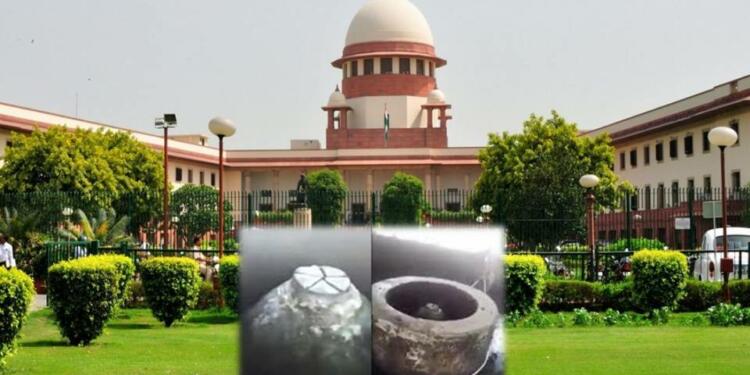Injustice anywhere-anytime is a threat to justice everywhere-every time. During the Islamic invasion of Bharat, lakhs of temples were destroyed and converted into Masjid. In modern times, the existence of any structure by the conversion of Hindu temples into Islamic architecture is a strike upon all the artful creations of our ancestors. Also, till the time these structures exist in a converted form, the wounds of Hindus would be kept alive. Now the time has come, to assimilate the idea of justice in Hindu society, wrongs done in the past by the invaders must be corrected in modern times. It is the moral as well as the legal obligation of the modern Indian state to collectively rectify the historical injustices.
Petitions Related To the Place of Worship Act Clubbed Together
On Friday, the Supreme Court of India allowed petitions related to the Places of Worship (Special Provisions) Act 1991 to be clubbed with similar matters pending before it. The Bench of Justice D.Y. Chandrachud and J.B. Pardiwala refused to entertain the new petition challenging the validity of the Places of Worship Act 1991. The court opined that if such petitions are allowed, it would open floodgates of similar petitions. Consequently, it would be appropriate if permission is granted to the petitioners to intervene in the pending proceedings.
#POWAct ORDER: Since writ petitions filed by @AshwiniUpadhyay& @Swamy39 have been entertained on same cause of action, it would be appropriate if permission is granted to these six petitioners before us to intervene in pending proceedings. They may file intervention applications. pic.twitter.com/UXjdKH74nb
— harish v nair (@harishvnair1) July 30, 2022
It is pertinent to note that the Delhi BJP leader and senior advocate, Ashwini Upadhy has already filed a PIL challenging the Constitutional validity of the Places of Worship (Special Provisions) Act, 1991.
Also Read: Why is the Centre dilly-dallying on identifying minorities at the state level?
The Unjust Law for Hindus
The Places of Worship (Special Provisions) Act, 1991 is an act passed by Congress in 1991 to maintain the status quo in places of worship. The act proclaimed to prohibit conversion of any place of worship and to provide for the maintenance of the religious character of any place of worship as it existed on the 15th day of August 1947.
Section 3 read with section 5 of the 1991 Act provides that except for the Ram Janma Bhumi-Babri Masjid, no person shall be allowed to convert any place of worship of any religious denomination.
Section 4(1) of the Act declares that “the religious character of a place of worship existing on the 15th day of August 1947 shall continue to be the same as it existed on that day”.
Further, section 4(2) of the act provides that “any suit, appeal or other proceedings with respect to the conversion of the religious character of any place of worship, existing on the 15th day of August 1947, is pending before any court, tribunal or other authority, the same shall abate. Also, no suit, appeal, or other proceedings with respect to any such matter shall lie on or after such commencement in any court, tribunal, or other authority.
Also Read: Places of Worship Act needs to go and the push needs to come from the government
The Places of Worship Act is breathing its last breath
Earlier in May 2022, the Mathura Court had accepted the petition filed by Shri Krishna Janmabhoomi Trust and others seeking ownership of the land upon which the Shahi Idgah Masjid is built.
The court rejected the argument of opposition parties that the suit is barred by the provisions of The Places of Worship (Special Provisions) Act 1991 and opined that “the provision of The Places of Worship (Special Provisions) Act 1991 are not applicable by virtue of section 4 (3)(b) of the Act”.
The court rejecting the argument of ‘the compromise’ held that “with regard to the entire property of Katra Keshav Deo, whether Shri Krishna Janma Bhoomi Seva Sangh had the power to enter into a compromise with Trust Shahi Idgah Masjid is a matter of evidence which can be determined only on the basis of the evidence adduced by both the parties during the trial” and by the virtue of section 4 (3)(b) of the act which effectively provides for the maintenance of status-quo of the structure, the plea is maintainable.
In furtherance to that, the court also rejected the argument of the opposite parties that the plea violates the provisions of Article 25. The court rejected the argument of the opposition and added, “Freedom of conscience and free profession, practice and propagation of religion – subject to public order, morality and health and to the other provisions of this Part, all persons are equally entitled to freedom of conscience and the right to freely profess, practice and propagate religion”.
Mathura court’s rejection of the opposition’s argument that the plea of Shri Krishna Janmabhoomi Trust is barred by the Places of Worship Act has already limited its effectiveness in a court of law. Further, the Supreme Court’s acceptance of the plea challenging the validity of the law itself has paved the way for its in applicableness. As parties are joining to challenge this unjust law, the Places of Worship Act is breathing its last breath.
Support TFI:
Support us to strengthen the ‘Right’ ideology of cultural nationalism by purchasing the best quality garments from TFI-STORE.COM

























